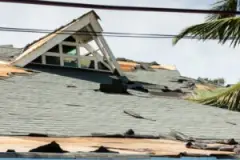
Experiencing property damage due to a hurricane is physically and emotionally exhausting. Understanding the various forms of hurricane damage and recognizing your legal options is crucial to your recovery.
Our Boca Raton hurricane property damage lawyers outlines the most common types of hurricane damage and provides guidance on how you can legally address these issues. The information here will help you get through the aftermath of a hurricane, including the often complex process of filing a hurricane damage insurance claim.
Wind Damage
Hurricanes bring intense wind speeds over 100 mph that can cause severe damage to properties. Wind damage is one of the most common results of hurricanes, manifesting in:
- Torn-off roofs
- Shattered windows
- Structural collapse
- Siding and gutters stripped from buildings.
- Damage to HVAC systems and other external utilities.
- Fallen or uprooted trees damaging property structures.
- Compromised building integrity due to loss of protective external features
- Detached garage doors or other large panels, which can act as sails in strong winds
When filing an insurance claim for wind damage, it’s essential to refer to local building codes and state statutes that might influence the eligibility for compensation. For instance, Florida’s Building Code specifies construction standards designed to withstand hurricane impacts, which can affect insurance claims and coverage.

Water Damage
Heavy rains are common during hurricanes, so it’s no surprise that beyond the immediate wind damage, water intrusion is a significant threat during hurricanes. This type of damage can include:
- Flooding
- Storm surges
- Prolonged exposure to water, leading to structural weakening and mold
- Submerged appliances and electrical systems leading to costly replacement
- Swelling and warping of wood flooring, door frames, and cabinetry
- Contamination of water supply and potential for waterborne diseases
- Erosion and undermining of property foundations due to water flow
Understanding the coverage scope of flood insurance, separate from standard homeowner’s insurance, is crucial. The National Flood Insurance Program (NFIP) guidelines and FEMA regulations provide a framework for what is covered and how to proceed with claims following water-related damage.
Impact Damage
The force of a hurricane can turn everyday objects into projectiles, resulting in impact damage to homes and other buildings. Common examples include:
- Tree limbs crashing into structures
- Debris breaking windows
- Shingles or roofing material blown off and striking nearby properties
- Outdoor furniture or play equipment being tossed against the house or other structures
- Vehicles being moved or damaged by flying debris
- Fences being knocked down or damaged by wind-carried debris
- Broken glass from high-rise buildings falling to the street level
- Signage from stores or street signs becoming detached and causing damage
Filing an insurance claim for impact damage may require understanding specific provisions within your policy, especially regarding what types of damage are considered ‘acts of God’ versus preventable occurrences and any local safety ordinances that might affect liability and coverage.

Electrical Damage
Electrical systems are particularly vulnerable during hurricanes. Damage can range from:
- Short-circuits due to water exposure
- Complete system overhauls from lightning strikes
- Overloaded circuits from power surges as the grid fluctuates
- Corrosion of wiring and fixtures due to water intrusion
- Disruption of power lines leading to extended outages
Ensuring that your home meets local electrical codes can prevent some forms of damage and facilitate the insurance claims process. Property owners should consult with professionals to assess electrical system integrity and ensure compliance with all local safety standards before and after repairs.

Structural Damage and Collapse
In severe cases, the structural integrity of buildings can fail, leading to partial or complete collapse. This catastrophic damage is not only dangerous but also complex when it comes to legal and insurance claims. Building codes, like those enforced in hurricane-prone areas, dictate standards that structures must meet to withstand severe weather, impacting both the likelihood of collapse and the insurance processes following such events.
Assessing the Damage and Your Legal Options After a Hurricane
After a hurricane, it’s essential to assess the damage thoroughly. This means:
- Documenting the extent with photographs and detailed notes
- Engaging with professionals for assessments
- Using these evaluations when dealing with insurance claims
Knowing when your situation requires legal advice can significantly affect the outcome of your insurance claims and potential lawsuits.
How to File an Insurance Claim for Hurricane Damage
Filing an insurance claim involves several steps:
- Notifying your insurer as soon as possible
- Providing detailed documentation of the damage
- Filling out the necessary claim forms
Be prepared to interact with an insurance adjuster who will assess the damage independently. Accompany them to ensure all damage is accounted for, but seek a second opinion if their evaluation seems low. Knowledge of your state’s insurance laws is crucial, as they may influence your claim’s processing and compensation.
In case of disputes or unsatisfactory compensation, understanding the procedure for contesting the insurer’s decision is vital. Keep a detailed record of all correspondence with the insurance company throughout. If the process becomes contentious, consulting with an attorney who specializes in insurance claims can provide guidance and support.
When to Seek Legal Help with Your Hurricane Damage Claim
In some situations, the complexity of a claim or the scale of damage makes legal assistance beneficial. If you encounter disputes with your insurance provider over the coverage of damages or the compensation offered, it might be time to seek legal help.
An attorney specializing in property damage can provide guidance, represent your interests in disputes, and help you get through the complexities of insurance claims following hurricane damage.
Choosing the Right Lawyer for Your Hurricane Damage Case
Selecting an attorney with experience handling post-hurricane insurance claims is crucial. Look for lawyers with specific experience in property damage and hurricane-related claims. Local expertise is also vital, as understanding regional laws and statutes can significantly impact the case’s outcome.
The legal team at Ged Lawyers has a track record of successfully handling hurricane damage claims and is prepared to help you assess your case without obligation.
Contact Ged Lawyers to File Your Hurricane Damage Claim
If your property has suffered hurricane damage and you’re working through the complex recovery process, reach out to us for assistance. With our expertise in property damage law and a deep understanding of local statutes, we can provide the guidance you need.
Contact us today for your free consultation. Let us help you ensure your rights are protected, and you receive the compensation you deserve.
